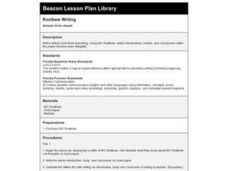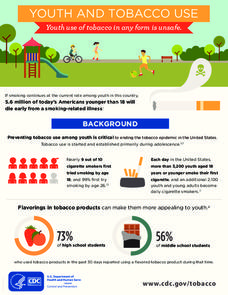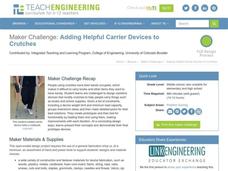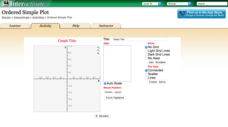Curated OER
Weather Journal
Sixth graders write in a journal using weather observations as the focus, they develop writing techniques in addition to scientific observation skills.
Curated OER
Divulging in Detail
Students rely on their senses to write descriptions of an object within their view. They incorporate different parts of speech in their descriptions. They write a descriptive paragraph about their object.
Curated OER
Everyday Objects As Artwork
Middle schoolers examine everyday Chinese objects and analyze why they are
considered artwork today in this multi-subject lesson for Middle School. Small group colaboration is emphasized.
Curated OER
Discovery Science Library: The Basics Physical Science
Young scholars examine friction and gravity. affect four sports. In this scientific discovery lesson, students examine how friction and gravity affect sports. They discuss, write, and illustrate the effect of different forces on various...
Curated OER
Rootbeer Writing
Students utilize IBC Rootbeer, to make introductions, bodies, and conclusions within the paper become more delightful.
Curated OER
Reading and Writing the Autobiography With a Study of Zora Neale Hurston
Students explore the possible relationships between characters in a novel. They read the novel 'Their Eyes Were Watching God' and answer all the questions on each chapter so that the characters and events are familiar to the students.
Centers for Disease Control and Prevention
Youth and Tobacco Use
There are a number of social, emotional, and physiological reasons why teenagers start smoking, and why they continue smoking into adulthood. Help class members understand why smoking begins in youth—and how to protect themselves from...
J. Paul Getty Trust
Exhibiting Common Threads
Artists working in different media often explore the same themes—to model how these same themes weave their way through different forms of artistic expression, scholars analyze images by Dorothea Lange, identifying key themes in her...
Polk County Public Schools
The Blame Game for the Loss at Pearl Harbor
Known as the day that will live in infamy, the attack on Pearl Harbor in 1941 was a shock to all. But why was the United States unprepared on that December morning? Study a series of primary sources in a document-based question that...
California Education Partners
Linflower Seeds
How does your garden grow? Use proportions to help Tim answer that question. By using their understanding of proportional relationships, pupils determine the number of seeds that will sprout. They create their own linear relationships...
California Education Partners
Speedy Texting
Model the effects of practice on texting speed. Pupils develop a linear equation that models the change in texting speed based on the amount of practice. The sixth performance task in an eight-part series requires learners to solve and...
Alabama Department of Archives and History
Extra! Extra! Read All About It?
Remember the Lusitania! As part of their study of the causes of World War I, class members examine newspaper articles and propaganda posters about the sinking of the Lusitania and then craft their own news story about the event.
Utah Education Network (UEN)
Real World Equations and Inequalities
Use of the resource = Opportunities for increased learning. Learners must use equations and inequalities to solve real-world and geometric problems.
Candace Fleming
Ben Franklin’s Almanac: Being a True Account of the Good Gentleman’s Life
Candace Fleming's award winning Ben Franklin's Almanac is the anchor text for a classroom guide that provides teachers with a cache of pre, during, and post-reading activities.
Wish for the Future
Wish for the Future
What would be your class's ideal world 30 years in the future? What about 100 years? Use a series of activities to discuss globalization, sustainability, scientific contributions to society, and the global community of which your...
Curated OER
Unit 1: Water is Life: The Heart and Science Behind this Phrase
Water, water, everywhere — but will there be enough to drink? Check out these detailed lesson plans to meet NGSS water cycle and CCSS literacy standards in your science classroom. Learners do a close reading of a challenging, poetic text...
Teach Engineering
Maker Challenge: Adding Helpful Carrier Devices to Crutches
Make breaking a leg a less troublesome experience. Groups brainstorm designs for crutches that have devices that help carry items. They build prototypes of their devices to test out their designs.
US Institute of Peace
Responding to Conflict: Negotiation—Identifying Wants and Needs
Let's make a deal! Are real negotiations as simple as they are in the game show? Scholars learn the art of negotiation during the 8th instructional activity in a series of 15. The activity kicks off with a fun group negotiation, then...
Shodor Education Foundation
Caesar Cipher
Caesar ciphers hide secret missives. A simple interactive lets users encode and decode hidden messages. The cipher method here is the Caesar shift.
Shodor Education Foundation
Ordered Simple Plot
Open your imagination to make algebra-inspired creations. An interactive lesson has scholars graph images from a set of parameters. Users can practice minimum values, maximum values, and scale as well as key features.
Curated OER
The Trash We Pass
Where does our garbage go? What is the difference between a recyclable and non-recyclable item? Pose these important, but often overlooked, questions to your class and invite them to consider the lasting and damaging effects of the...
TryEngineering
Data Representation: Millions of Colors
How many colors do you know? The lesson teaches scholars how digital devices use binary and hexadecimal representations to store colors. They learn how millions of colors are available on these devices.
TryEngineering
Sorting Socks is Algorithm Complexity
Use hosiery to teach computer science. Scholars use socks to develop a set of algorithms. They find ways to find a particular sock from a set and ways to sort socks. Finally, they use their algorithms to consider time complexity.
US Institute of Peace
Taking a Step Toward Peacebuilding
What can someone do to increase the peace? Pupils take small steps toward a big peacebuilding role in the final lesson in a 15-part unit. Individuals identify their roles as a peacebuilder and create a stepping stone that reflects their...
Other popular searches
- Writing Fables Middle School
- Middle School Writing Skills
- Middle School Writing Odes
- Writing Poetry Middle School
- Middle School Writing Plots

























